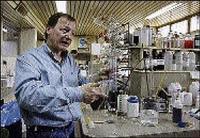Jamaica's health and the CSME - Part 2
Published: Sunday | January 11, 2009

Hall
The following is an extract from a presentation made in June last year by Dr John Hall, consultant neurologist and past president of the Medical Association of Jamaica, at an MAJ symposium. The first part was published last week.
FOOD SECURITY like pharmaceuticals raises queries about Caribbean self-sufficiency. We have seen these two entities used as weapons of economic sanctions in our own hemisphere. Food security revolves around three domains: fruits and ground provisions, milk and the dairy industry, and grain.
Fruits and ground provisions are vulnerable to natural and man-made disasters. In Jamaica, after Hurricane Dean of October 2007, fruits were in short supply: ripe bananas did not become available until March 2008; carrots, callaloo, and other vegetables were unavailable; and just as they were returning there was a major bush fire in St Elizabeth. Prices spiralled.
The milk and dairy industries are under threat. In 2007, Jamaica produced 14 million litres of milk, i.e., two thirds the production of 2002. This progressive decline in milk production has led to massive milk powder importation. The local press has pointed to some of the possible public-health implications of this. But clearly this practice can only deepen the decline of the dairy industry. What a disservice to the grand legacy of the distinguished veterinarian and geneticist, Dr T.P. Lecky, whose Jamaica Hope breed of cattle added so significantly to the nutrition, and economy of Jamaica and the other CARICOM Single Market and Economy (CSME) states. An opportunity is beckoning the CSME states to revive the legacy of Dr T.P. Lecky so critical to the health of the region.
Food grains have been making international news recently. They are an essential pillar of food security in the CSME. The six major grain producers in the world - Australia, USA, Brasil, Canada, Ukraine and Kazakhstan - have reportedly diverted 30 per cent of their production to biofuels manufacture. Not only does this reduce grain availability for food, but also for feeds in the poultry and beef industries. Beef and poultry production have declined. Prices have risen over five per cent. A new international phenomenon has arisen, namely an interface and conflict between food and biofuels. From the viewpoint of Jamaica and the CSME, this biofuels policy is highly questionable. It is creating a shortage of food grains globally and locally, creating price increases for food grains, chicken and beef, and creating a threat of hunger and social upheaval. Food riots have already occurred in Indonesia, Turkey, the Ivory Coast and in nearby Haiti. Jamaica and the CSME states do not need a return to the long gone days of kwashiorkor.

Gustavo Bianchi, who has a doctorate in chemistry, speaks during an interview with Reuters at the lab of the True Chemistry company in Monte Grande, on the outskirts of Buenos Aires, Argentina, in this picture taken on September 14, 2006. Most people think of beet, corn and sugar cane as basic foodstuffs, but Argentine scientists keen to take biofuels a step further are using them to develop a greener alternative to petrochemicals. The pioneering project led by Bianchi, being developed by a small company on the fringes of Buenos Aires, aims to use ethanol as a replacement for traditional fossil fuels to make products for motorists ranging from brake fluid to engine coolant. - file
PRIORITISING AGRICULTURE
In a scenario of the energy crisis plus the biofuels policy, the formula means prioritising agriculture. Jamaica and the CSME have no choice. The rationale is unequivocal: vulnerability to food insecurity, soaring world food prices, a population outstripping food supply, and climate change already affecting crop yields.
The methodology will mean financing for better farming inputs.
It will require expanding the extension services to advise farmers on new technologies, high-yield seeds, and extensive small-scale irrigation. To diversify production, community nurseries will be needed, and market-based techniques of financial management will facilitate, among other needs, weather-risk insurance for farm communities.
Such an approach, in my view, might well bring revolutionary results in Jamaica and the other CSME states. Farm harvests and farm incomes would increase. An escape route from subsistence conditions and poverty would come into view for that one third of the population living in rural areas. From the boost in agricultural production would come profitable participation in the market economy, a reduction in the rural-urban drift, a more stable and healthier society. Jamaica and the other CSME states seem to have no option. Political will is required.
Caribbean governments need to prepare strategies to resist the inevitable artificial price wars geared to compromising local production.
Obseity, diabetes and smoking problems, with which every clinician is familiar, must be mentioned as perceived threats to the health of Jamaica and the other CSME states.
Obesity is a threatening epidemic. Much of it relates to cultural penetration of the fast-food phenomenon and changing lifestyles in pursuit of the "dream" portrayed on cable TV.
Diabetes is closely related to obesity. At present, there are 300,000 diabetics in Jamaica, and by 2020 it is estimated that there will be one million. Projections are for a population prevalence of 10 per cent in the Caribbean within the next decade. Diabetes is closely tied to hypertension, cardiovascular and end-stage renal disease, which are growing problems in the Caribbean. Jamaica and the other CSME states must forge a coordinated, regional plan for these health problems.
Smoking, like diabetes, is synergistically linked to obesity. Surveys have shown smoking prevalence to be inversely proportional to socio-economic advantage. One notes increased smoking in third-world countries such as ours. The bottom-line is the expatriation of profits to shareholders' dividends, the escalation of lung cancer, and premature deaths from cardiovascular and respiratory diseases in our countries, in ever threatening proportions. Tobacco-control policies in our countries need more impetus. Life is too precious to go up in smoke.
Economic migrants of skilled professionals and unskilled labour seem inevitable. By sheer weight of numbers they might overwhelm the available local health facilities in any one CSME territory. Clearly, controls and good border policing, throughout the CSME integration process, will be mandatory. Yet to be clarified are the effects of free movement of capital and labour, unskilled and skilled professionals (e.g. health workers) under the CSME policy decisions. There are also the WTO rules on the movement of services and professionals, raising the question as to whether professional services in the CSME will be open to USA and other nationals setting up their practice.
VIOLENCE and the NARCOTICS/DRUGS TRADE
Violence and the drugs trade are twin challenges to the way of life in all the territories of the CSME. They constitute threats to the economic, cultural and political stability. Orlando Patterson, the internationally known sociologist, had stated that in Jamaica criminal violence is five times higher than in the USA and 25 times higher than in the UK. In Jamaica, the homicide rate is 35 per 100,000, compared to 15 per 100,000 in the Organisation of Eastern Caribbean States (OECS), part of the CSME: 2003 figures (Economist 20/3/2008). The strain on the public hospital facilities in Jamaica is overwhelming the accident and emergency departments, and the operating theatres, to the tune of some $7 billion per annum. The trend appears to be spreading throughout the CSME.
The causes of criminal violence in Jamaica are multifactorial. In his book, the Marginalised Male, Professor Errol Miller traces and defines some important factors impacting adolescents and young men. Dr Ralph Thompson, a prolific columnist for The Gleaner newspaper, has repeatedly drawn attention to the endemic, poor, educational performance in primary and secondary schools. Added to this is the palpable decline economically, over the last 20 years, which has stimulated the rural-urban drift, growing unemployment, and the growth of squatter-ghetto communities in urban areas.
Into this maelstrom has been thrown, literally, the deportee phenomenon - thousands of convicted criminals repatriated to Jamaica and other CSME states from the UK, Canada and the USA. Their linkage to burgeoning criminal violence, and well as to the drugs and gun trade, is unequivocal. Their international connections are well established.
The Economist reports the narcotics trade as being 7.5 per cent of GDP in Jamaica. The situation in Jamaica is causing serious concern as the murder rate rises. Has this got political connections? Could this be a harbinger of the unrest which spread through the Caribbean in 1938, leading to the historic Lord Moyne Commission, which set the stage for significant social and political reforms in the then British West Indies?
THE WAY FORWARD
There is room for cautious optimism. Health can be a bridge to social cohesion, peace and political stability. The welfare of Jamaican and the other CSME states will depend on events within, as well as without, their collective borders. Hence the importance of coordinated cooperation in many crucial areas of public health, security and education. Sustainable development has to be led by visionary leadership, which inspires and empowers the citizenry. Education is key, in much the same way the Realtor speaks of location, location, location.
Much will depend upon investment that is socially responsible, whether this is local capital or direct foreign investment. It is critical that any investment promotes healthy living and lifestyles, and protects our air and water quality.
Investments should also protect our residential and farming communities, with due regard to the burial grounds of our ancestors.
Our beautiful beaches should be specially protected from destructive developments.
Future challenges are inevitable. The direction of migrating populations of professionals and other workers will have significant impact on health, wealth and development. The doctor/patient ratio and the nurse/patient ratio will need close monitoring. An inescapable developmental pillar must be a unified Caribbean Medical Council, acting as an inspectorate for licensing and discipline within the profession. A unified CSME policy must evolve to prevent the spread of epidemic diseases, the pandemic of HIV/AIDS, and societal violence. And let us not forget strengthening the Faculty of Medicine at UWI, Mona, and discouraging fragmentation.
Sir William Osler, the doyen of Canadian medicine early in the last century, has enjoined us "to prevent disease and heal the sick as the prime focus of our work". Yet today after 46 years of political independence in Jamaica, the countries of the CSME find themselves bound in a "technological lag", in some areas, with inadequately funded health services, fire services, and energy supplies. It is prudent to note that the war in Iraq costs US$4.7 billion per month. In contrast, the Global Fund (2002) for disease prevention in 31 countries was US$300 million. In this regard, the conclusions of Mayhew, et al (Lancet 2005) are enlightening: "The rich countries have never been richer, but the fraction of GDP given in development assistance is at 0.25 per cent , about half of what it was in 1960."
Jamaica and the countries of the CSME must recognise that with changing times, technological, social, cultural and political developments, they need to reposition, retool and restructure, and relinquish some long-held attitude and beliefs, if health, wealth and sustainable development are to be achieved.
Wisdom is supple, folly sticks in the groove (Theognis, 6 BC).
